“It’s not a protest, it’s a scream”: The growing anti-war movement inside Israel
What began as sporadic outrage has grown into mass mobilization. From Tel Aviv to Jerusalem, protesters are calling for peace—and for political change.
In central Tel Aviv, the ground is trembling beneath a sea of marching feet and pounding drums.
A throng of protesters has descended in the center of Israel’s major urban city in a show of dissent. Israeli flags wave in the air beside political placards and photographs of the men and women still being held captive in Gaza. Chants of “Akshav!”- now - ring out across the crowd. Even without understanding a word of Hebrew, the frustration and desperation are palpable.
A few people are wearing “Fuck BNGVR” t-shirts, a reference to Itamar Ben-Gvir, the far-right Security Minister who has a history of making outrage-inciting comments and provoking Palestinians.
“It’s not a protest, it’s a scream,” one woman tells me. “We want our brothers and sisters home.”
The voices of protest have grown louder each week. Just last month, an estimated one million Israelis participated in a nationwide strike—the biggest demonstration so far—opposing the government’s recent decision to escalate its military campaign into Gaza City.
The war in Gaza was ignited by the devastating Hamas attack on October 7, 2023, which killed over 1,200 people in southern Israel and led to the abduction of over 200 hostages. The Israeli government responded with a massive military operation in the coastal enclave.
Since then, over 64,000 people—most of them women and children—have been killed, according to the Gaza Health Ministry, and the Israeli army has shown no signs of ending the offensive.
The violence has now spilled out into mainland Israel. On September 8th, Jerusalem experienced one of the deadliest attacks the city has seen in recent times, when two gunmen boarded a bus at rush hour and shot dead six people. Hamas has since claimed responsibility, praising the "resistance fighters" who carried out the attack.
The two attackers, reportedly from the occupied West Bank, were shot dead by police. A third suspect was later arrested.
Despite international calls for a ceasefire, Israel has expanded its campaign in Gaza. Many former military leaders argue the IDF has achieved all it can militarily. Yet the Israeli prime minister, Benjamin Netanyahu, remains defiant.
People explain that there is now a growing rift between Israel’s military and political leadership. “The cabinet will occupy Gaza, but it won’t bring back the hostages,” one speaker declares from the stage.
The IDF has issued an evacuation order for the densely populated Gaza City, placing the fate of its one million residents in limbo—forced to decide between displacement or remaining amid intensifying Israeli bombing.
Humanitarian groups have issued urgent warnings that an assault on Gaza City—already in the grips of famine—would be catastrophic for its residents and for the strip as a whole.
At the rally, which I attended, around 350,000 people converged on the so-called Hostage Square in Tel Aviv plaza, a focal point for protesters since October 7, calling for an end to the war and the return of all hostages.
Several are chanting “Shame!” and “Dai!” –Enough.
“Our government is against the people,” says Nitza, who has travelled from Haifa. “They’re not the government of the people; they act against the country and the interests of the nation.”
She, along with several others, worries that this war could further radicalize future generations in Gaza. “The more we destroy, the more those children who survive will grow up to hate us even more.”
When I last visited Israel 18 months ago, scenes like this would have been unthinkable. Sure, there were pictures of hostages plastered on walls or shop windows, as well as yellow ribbons symbolizing hope and solidarity with the hostages, tied around trees or lampposts.
But something fundamental has shifted. Back then, most Israelis were only demanding that the hostages be returned. Now, they want a complete end to the war.
Though there is far from a national consensus—some still support continuing the war to dismantle Hamas—a growing segment of Israeli society completely sees this as “Netanyahu’s war,” prolonged for personal political survival.
“Every additional day of the war puts the remaining hostages in danger,” says one speaker on stage. “President Trump, look at this crowd. Look at Israel—the people are voting with their feet.”
A white banner reading, “So this is Trump’s legacy?” flutters above the crowd, marked with painted blood drops that drip like accusations through the air.
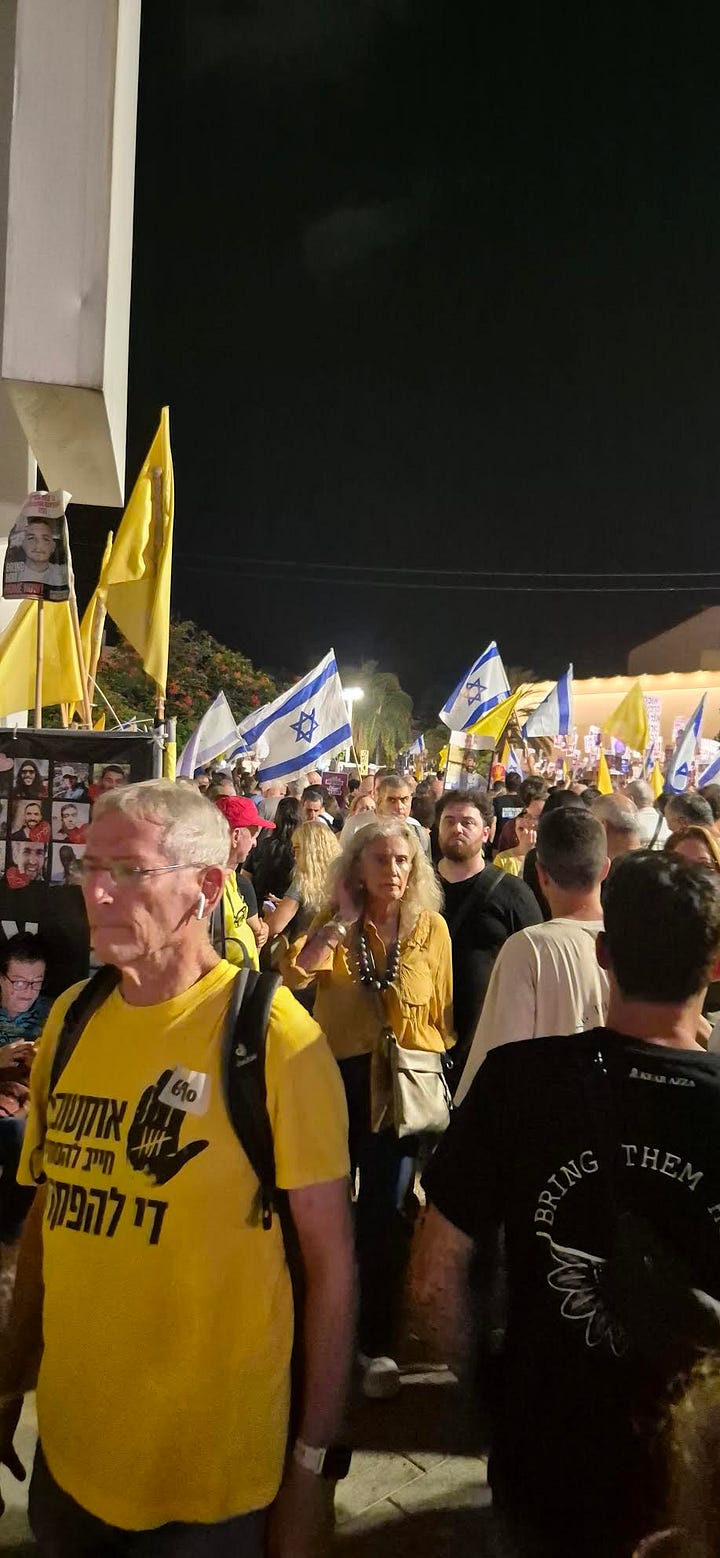
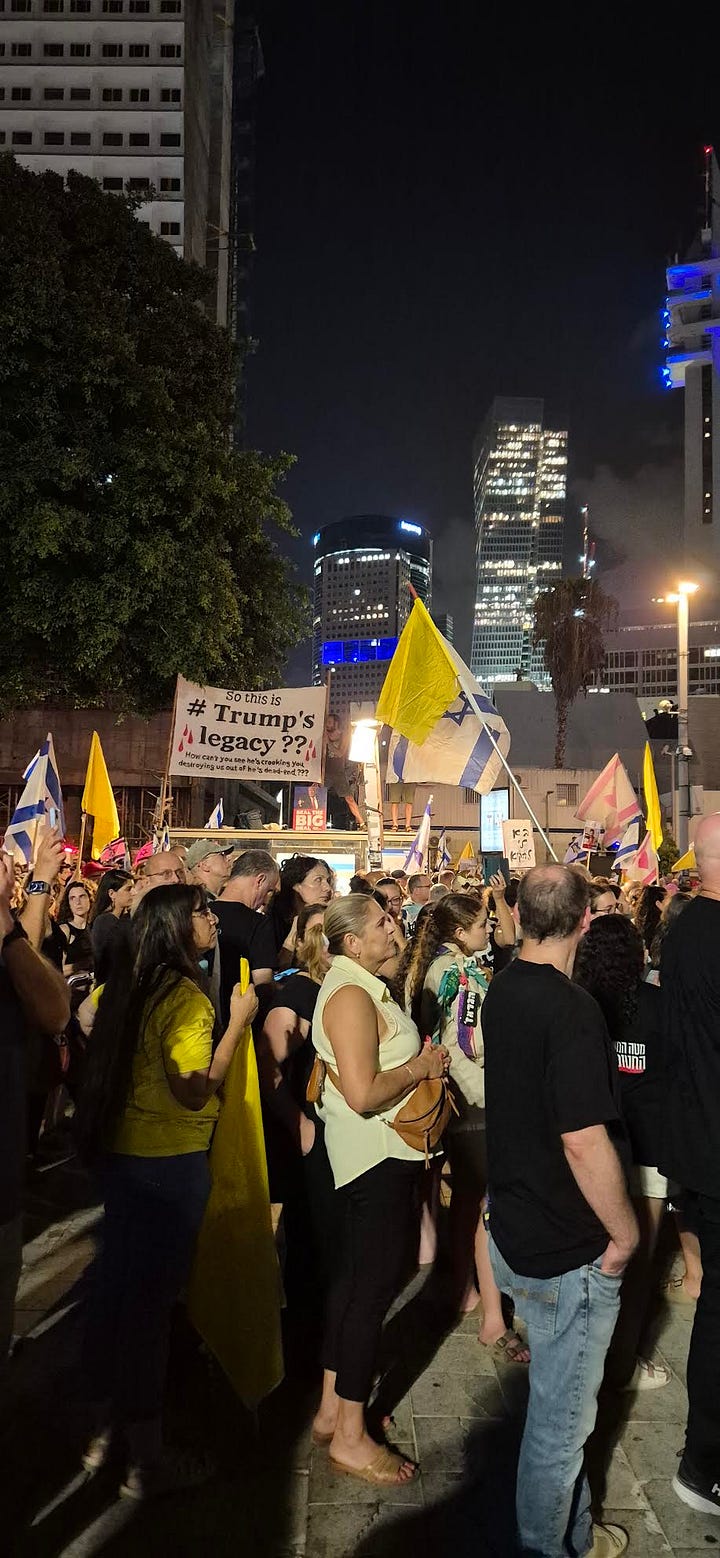
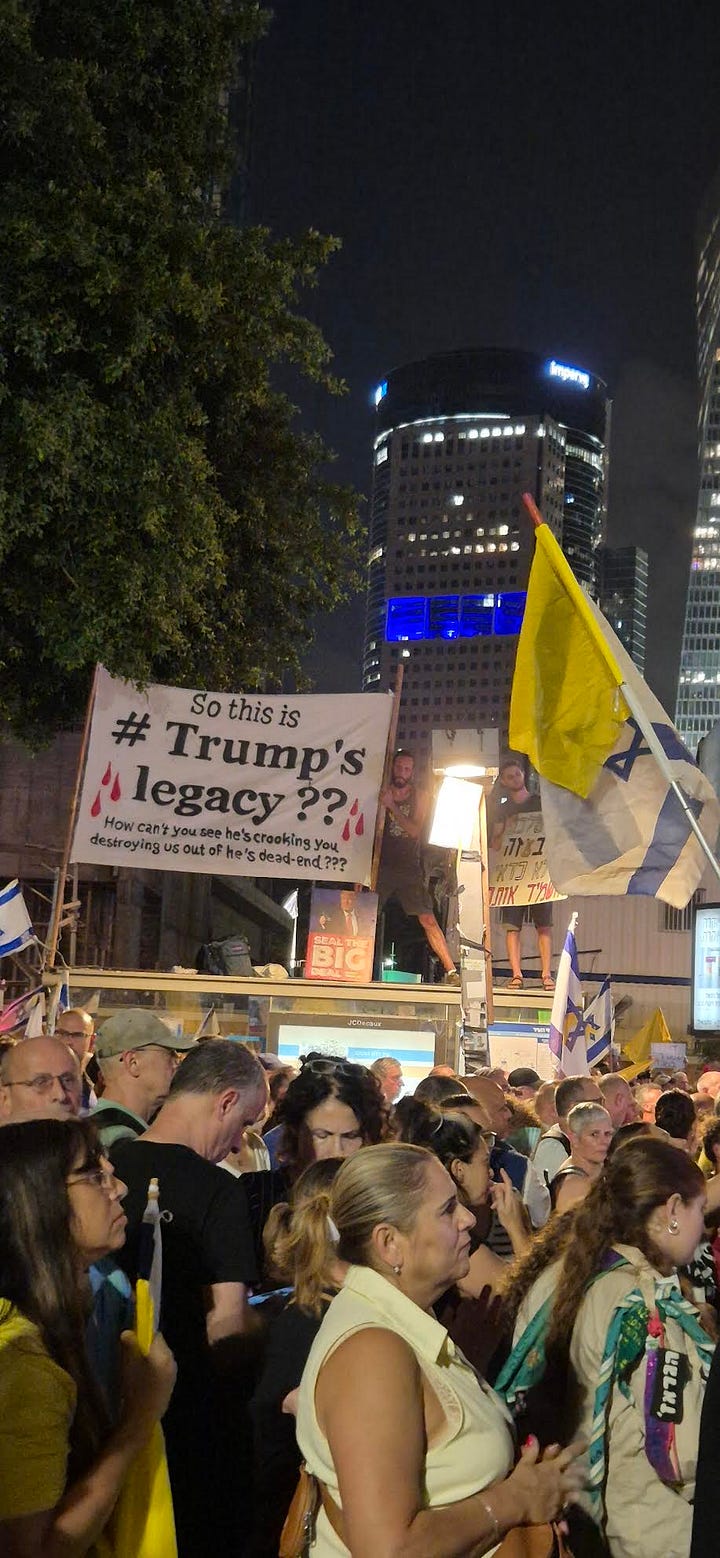
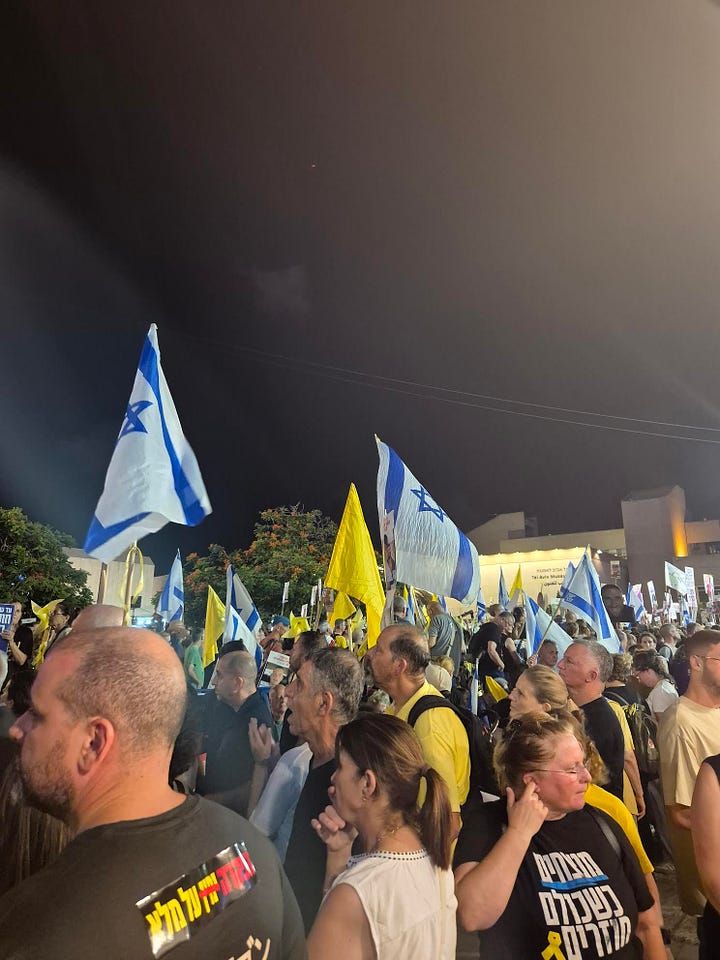
Donald Trump, on September 7th, issued his “last warning” to Hamas, urging the Palestinian militant group to accept a deal to release all the hostages.
Negotiators from the US, Qatar, and Egypt have been working on a ceasefire deal for months. Still, Israeli officials have repeatedly rejected or failed to respond to efforts to bring an end to their military operations.
Sushanna, from Tel Aviv, was once an avowed fan of Netanyahu. She now believes the war is further damaging Israel’s reputation abroad. “This situation is causing more antisemitism around the world,” she says.
Jonathan Javor, a former parliamentary adviser who has consulted senior Israeli politicians, understands the feelings of frustration on display. The country, he says, is not built for long wars.
“People are tired of two years of war,” he says. “The government has not achieved its goals of defeating Hamas or bringing the hostages home.”
But he is clear about accountability: “The heads of the military and intelligence services should have resigned after October 7. The government should also have offered to resign and then offered re-elections—it’s the moral and ethical duty in a democratic state. Israel needs a reset. We need new blood.”
Despite the growing death toll in Gaza, many Israelis remain indifferent. A poll conducted by the Israeli Democracy Institute in July found that 78 percent of Jewish Israelis believe Israel is doing its best to avoid unnecessary suffering in Gaza. Only 22.5 percent of Arab Israelis concur.
Another survey by the Chord Center at Hebrew University found that 64 percent of Israelis believe “there are no innocents” in Gaza.
Part of this is a trauma response to the October 7 attacks. The other is down to mainstream media in Israel choosing to ignore the suffering of Gazans or Palestinians in the occupied West Bank.
Despite the overwhelming evidence documenting Israel’s alleged war crimes and pictures of Gaza’s neighborhoods reduced to rubble, the Israeli public believes the reports are “Hamas propaganda.”
Several journalists who work for global and domestic publications told the Reuters Institute for the Study of Journalism that “there is a ‘them or us’ mentality in [Israeli] media coverage”.
Any outlet not serving as a "complete propaganda tool" for Netanyahu is deemed an "enemy" or "traitor" and is subject to sanctions or closure.
Avi Dabush, from Rabbis for Human Rights (RHR)—which promotes and protects human rights in Israel and the occupied Palestinian Territories—is not surprised by the findings.
“People in Israel can’t see what the rest of the world is seeing,” he tells me in RHR’s office in Jerusalem. “Our values are being destroyed. I believe Judaism is about fighting indifference. The majority are only against the war because of hostages and soldiers dying, not because of dead Palestinians.”
Avi is a committed advocate of peace, not just in theory, but through lived experience. On October 7, he and his family narrowly escaped death when terrorists infiltrated his home in Kibbutz Nirim, just a few miles from the Gaza border. The residents were evacuated to the port city of Eilat.
His house overlooks the central Gazan city of Khan Yunis. “My view was of all the houses or mosques. You don’t see that anymore,” he sighs.
While Dabush remains steadfast in his feelings of compassion and peace, many others have chosen anger or vengeance.
He recalls a conversation he had with a mother whose two children were kidnapped from their home in a kibbutz near Gaza. They were later returned in the first ceasefire.
“She said, ‘From the age of three, there are no innocent people in Gaza.’ She's a mother and emotional. In a way I can understand,” says Avi. “But this is a catastrophe for us, to talk in those terms, and treat the other side as a monolith.”
But for the likes of Jonathan Javor, things have shifted irrevocably.
“The old concept is dead,” he says. “Even for the left, which once said that Arabs want to live side by side. Most don’t believe that anymore. The two-state solution is not even an option right now—maybe in the future. It’s bleak for the time being.”
Dabus is adamant that many Palestinians do want peace. On the other hand, he says, “You also have people in Israel who are not partners for peace—religious zionists who really believe God is on our side and wants us to kill them all and for us to conquer the holy land.”
The far-right Finance Minister Bezalel Smotrich recently unveiled plans to annex nearly 80 percent of the West Bank—an illegal move under international law. The UAE, a signatory of the 2020 Abraham Accords, warned Israel that doing so would “cross a red line” and destroy the possibility of a two-state solution.
Still, the protesters come. “It feels like we’re in a revolving door and we’re not going anywhere,” a man named Shai tells me. “We need peace.”
What began as indifference and then outrage has, nearly two years on, turned into a sustained movement. Whether it can reshape Israel’s politics, end the war, or bring the hostages home remains uncertain. But on the streets of Tel Aviv and Jerusalem, thousands continue to raise their voices and say “khalas”—enough.
Middle East Uncovered is powered by Ideas Beyond Borders. The views expressed in Middle East Uncovered are those of the authors and do not necessarily reflect the views of Ideas Beyond Borders.



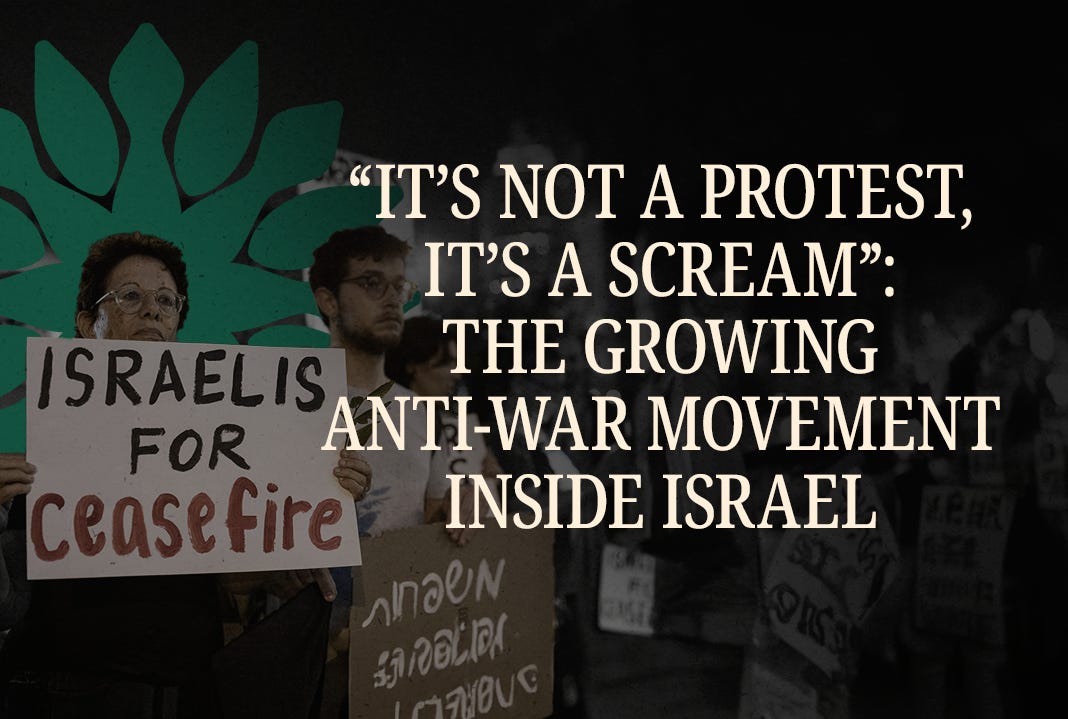

just move back to your actual homelands
the end
The problem here is the use of "occupied Palestinian Territories". Palestine is a Roman administrative state and the British copied it. There is no Palestinian nationalism. None at all. If there was, October 7 would never had happened and Hamas would never been elected and Gaza would not have hundreds of miles of buried terrorist tunnels.